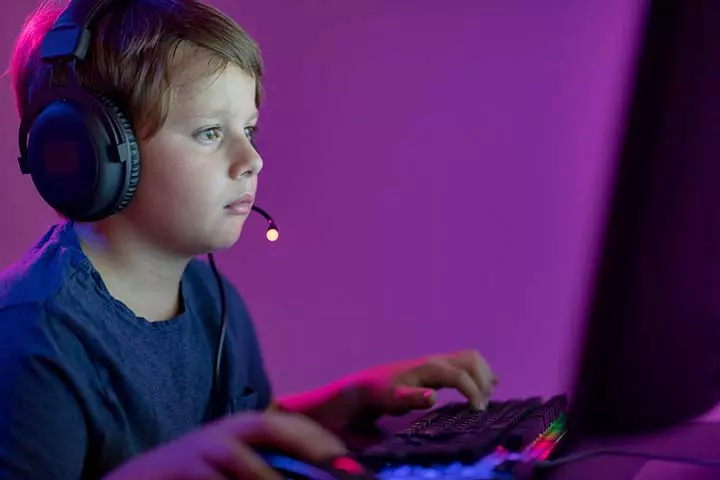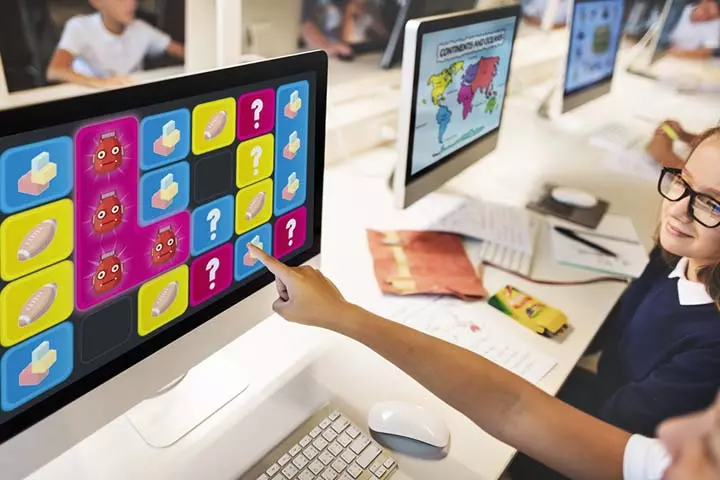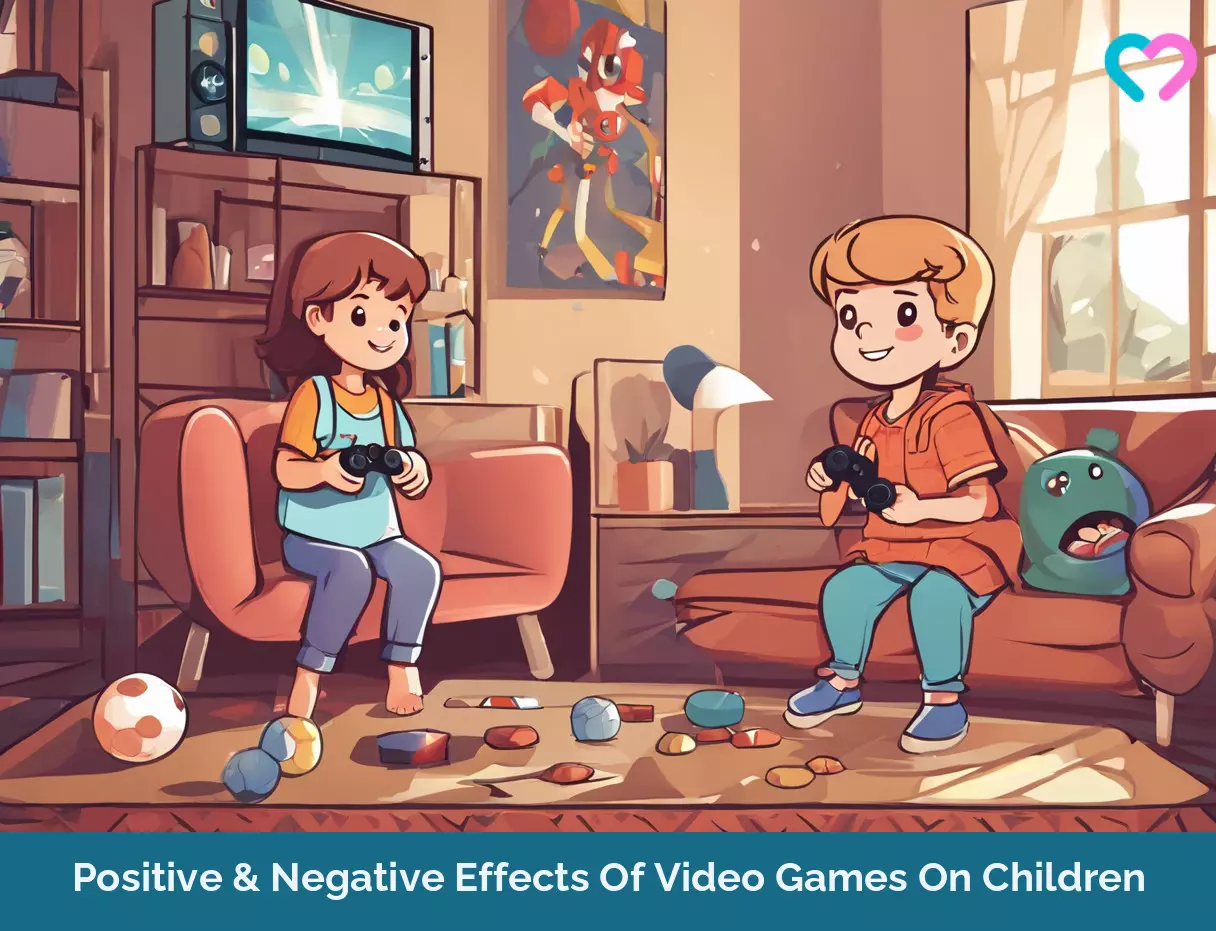
Image: iStock
The world of video games provides endless entertainment for children and adults alike. However, parents are often concerned about the ill effects of video games on children, especially if they seem to be addicted to spending long hours in front of the screen. In addition, concerns about developmental problems in children have also been raised in this perspective. Nevertheless, recent studies have shown video games to have a less harmful impact than usually perceived. On the contrary, positive effects on a child’s social and cognitive development have been indicated if children play responsibly under parental vigilance. Delve into this post as we tell you about the pros and cons of playing video games.

Key Pointers
- Video games can have positive or negative effects based on content and playing time.
- Positive effects: improved social skills, problem-solving, mood, and attention.
- Negative effects: aggressive behavior, poor attention, addiction, and decreased physical activity.
- Parents should monitor content and control playing time to encourage physical activity in children.
Are Video Games Good For Kids?
Depending on the content and the amount of time spent playing, video games can have positive as well as negative effects on your child. For instance, a study by Hastings (2008) showed that educational video games were associated with good academic performance, while violent video games were associated with troublesome behavior (1).
However, these results depend on two factors – the game play and frequency of playing. As a parent, you may want to control these factors.
The next section shares the positive and negative effects of video games on child development.
Positive And Negative Effects Of Video Games On Children
Positive effects of video games on children
If you are against video games and seldom allow your children to play, then you might want to know about some benefits of playing useful games.
- Uplift mood and strengthen social skills: Video games can help with stress relief, as they provide a safe and enjoyable way for children to unwind and relax. Simple-to-play and easy-to-access games like Angry Birds may uplift mood, promote relaxation, and develop positive emotions, like joy. The visual stimulation provided by the game can help distract the mind from boredom and frustration. Multiplayer games might help children develop positive relationships via social interaction. However, you may also try some non-screen activities to strengthen a child’s social skills and support their emotional development.
- Give a boost to creativity: A psychological research study by Iowa State University revealed that in some situations, video games might help enhance creativity (2). Creativity is an essential skill that lets your child think out of the box.
- Develop problem-solving skills: Research indicates that strategic games and role-playing games may help develop and enhance problem-solving skills in children (3). It can help the child learn the skill to develop an overall strategy with the available resources.

- Improve attention and working memory performance: Research indicates that playing a target-oriented action video game could be one of the approaches to help your child develop the skill of selective information processing. Some computer games for kids, particularly action and simulation games, can also help improve kids’ attention span and enhance their motor skills. This skill is important to use information in the best way to navigate through complex and dynamic environments (4).
- Enhanced situational awareness: It was observed that action video games could improve a player’s situational awareness (5). Gaining situational awareness is important to perceive, comprehend, and predict information to minimize errors and improve performance.
- Stimulate learning: Humans, in general, have a fascinating ability to acquire new skills. Studies suggest that playing action video games may support a child’s ability to learn new tasks and skills (6).
 Quick fact
Quick fact- Sharpened visuospatial skills: Research shows that games provide visual stimuli that could help sharpen a child’s visual and spatial skills (4). The visuospatial skill is one of the necessary cognitive skills needed for movement, depth, distance perception, and spatial navigationiAbility to accurately track changes in position and orientation to reach a goal or destination. .
- Enhanced eye-hand coordination: Sharp visuospatial skills and swift hand-eye coordination are requisites for playing several fast-paced action games. Playing video games might help improve a child’s eye-hand coordination in the long-term (7).
 Things to know
Things to know- Strategic planning and management of resources: Playing video games can enhance communication skills, as many games necessitate teamwork and collaboration. Furthermore, studies suggest that simulation games could foster the prudent use of available resources. This skill can help a child stay organized through effective resources (such as toys and pocket money) and time management.
- Increased health awareness: A recent study showed that video games clubbed with fitness coaching and a step tracker helped overweight children lose excess weight, lower blood pressure, cholesterol, and increase physical activity (8). Video games can encourage self-care skills, which, in turn, could improve a child’s physical and mental well-being.
Playing video games has its merits provided not done in excess. The impact of gaming could be adverse too.
Negative effects of video games on children
There are several negative effects of video games, which are majorly associated with its extended and unregulated use. Here is a list of such negative effects.
- Over stimulation of the sensory system: When a child plays video games, screen visuals with bright colors and quick movements send overstimulating messages to the nervous system. This creates a flight or fight response in the body due to the adrenaline, a stress hormone. However, when the child is not playing video games, this stimulation decreases, thus causing sensory deprivation leading to irritability, poor attention, difficulty observing directions, and other neurological effects (9).

- Aggressive behavior: According to the American Academy of Pediatrics (AAP) and the American Psychological Association (APA), violent video games may increase the risk of violent behavior in children (10) (11). AAP recommends that parents protect children under age six from all virtual violence since the child cannot distinguish between fantasy and reality (12). Besides, simulated violence may desensitize the young child leading to unwanted effects.
- Association with wrong values: It is often said that video games present a warped sense of right and wrong. In cases where the child fails to keep a moral check, they may be tempted to practice social isolation and spend more time engaging in risk-taking behavior, such as smoking, binge drinking, and reckless driving. Some researchers believe that certain video games could decrease psychosocial characteristics, such as empathy and moral engagement (11).
- Poor social development: Research has shown that heavy use of video games can impact a child’s social development (9). This mostly happens due to the self-imposed isolation that children practice to make more time to play. However, this effect is highly case-specific and can be mitigated with proper parental guidance.
- Physical health issues: The extended use of sedentary video games can impact a child’s health by affecting their eating and sleeping patterns (13). Some of the other concerns that are associated with sedentary video gaming are:
- increased weight/obesity
- seizures
- musculoskeletal disorders
- nerve compression
The above effects are often results of heavy sedentary gaming and poor ergonomics while playing. Thus, some researchers look at active video gaming that involves body movement as a solution to these concerns (14).
- Mental health issues: Lack of sleep and the overstimulated sensory system can lead to irritability, mood swings, and aggression. It has been observed that extended use of video games may lead to mental health concerns, such as ADHD. However, more targeted research is needed in children to prove the case.
- Academic concerns: A study noted a direct association between video games and poor academic outcomes, such as falling grades (15). This outcome is majorly related to attention issues and impulsiveness created by video games (16). Several experts suggest that playing video games in excess alters brain functions, thus causing a drop in academic performance.
Signs Of Video Game Addiction In Children
Playing video games can be fun, interesting, and intriguing. Thus, children get addicted to them. However, by keeping an eye on your child’s playtime, physical health, and overall behavior, you can regulate your child’s gaming habits.
Here are some signs that might indicate that your child is developing a video game addiction.
Physical symptoms
- A general sense of laziness or fatigue.
- Frequent headaches due to increased video game usage that causes eye strain.
- Neck and shoulder stiffness due to stretched hours of sitting.
- Development of carpal tunnel syndromeiCondition where the nerve connecting the forearm to the palm gets squeezed, causing numbness or tingling. . It could occur due to the overuse of a controller or computer mouse.
- Increase in weight due to a sedentary lifestyle.
- Poor appetite and personal hygiene.
Emotional symptoms
- Powerful feelings of anxiety, restlessness, and/or irritability when unable to play.
- Intense emotional outbursts when not allowed to play.
- Cognitive and attention problems that affect academic performance.
- Daydreaming about previous online gaming or activity.
- Intense and restless anticipation of the next gaming session.
- Lying to friends or family about the total time spent playing.
- Isolating oneself (social isolation) to spend more time gaming.
- Increased psychological issues, such as depression and low self-esteem.
There could be several other significant signs that could indicate addiction. Thus, it is wise to take some swift measures.
How Can Parents Avoid The Negative Effects of Video Games?
Excessive gaming is a result of addiction, that when neglected, could lead to “pathological gamingi Inability to control excessive gaming habit. .” As a parent, you can take some prompt steps to ensure that your child enjoys video games without going overboard and falling prey to the negatives. Below are some measures that you could consider trying.
- Video games are age-based, so ensure that you do not expose your child to a game that is not appropriate for their age.
- Prefer educational games to casual games for young children.

- Check for video game rating or recommended age for playing a game. Avoid buying violent video games for young children, as they may lead to impulse control issues, which could lead to violent behavior.
- Check the content of the game and speculate its possible beneficial effects on your child. Read the given warnings and act accordingly.
- The day you share the game with your child, explain to them the playtime rules that they need to follow.
- Set a screen time that is agreed upon mutually. It should include the time spent on-screen, on computer games, and mobile games, including the time spent playing video games at a friend’s place.
- Get a reward system in action to allow your child to play only after finishing their homework. Give them some additional 10-15 minutes to play on weekends if they spend 30 minutes doing physical activities like running, swimming, etc., every day.
- Do not allow gaming at night, especially around sleep time. It is essential to ensure that your child is not compromising on his/her sleep to play video games.
- Keep all the gaming gadgets and electronic devices such as tabs away from your child’s room.
- Join your child while playing. Choose multiplayer family games online that everyone can play together. It will strengthen your bond, develop positive emotions, and will help your child understand your intentions.
- If you are gaming with your child, ensure you follow the same rules as you have set for your child. Be a role model and guide them through.
- Keep an eye on their online activity. If they have been interacting with strangers while playing games, check on details like what they talk and how much they talk.
- Guide your child to play safely and not share any personal information with a stranger online.

- To stay vigilant, set up all gaming equipment in an area that you can easily monitor, without making your child feel intruded.
- Educate them about the negative effects of video games by presenting relevant examples. Ensure that you talk about the positive aspects, too. Strike a balance and convince them to follow a middle path.
 Quick tip
Quick tipFrequently Asked Questions
1. How do video games affect brain development in children?
Studies demonstrate that video game play (of about three hours a day) could be linked to enhanced brain activity in attention and memory regions, as well as increased activity in frontal regions (involved in complex tasks) (17).
2. Do video games affect personality?
Research on the effects of video games on personality has had mixed results, and the impact may depend on various factors. It is important to choose appropriate games, considering their potential effects on the child’s behavior (18).
4. How do video games affect the behavior of children with ADHD?
Video games do not cause ADHD; however, children with ADHD who play many video games have worsened symptoms. Video games are addictive for children with ADHD as they release dopamine, a feel-good hormone. Also, these games tend to give instant gratification to children with ADHD; hence, they might find these games more compelling than children who do not have ADHD (19).
5. Can video games impact the language development of children?
Playing educational video games can help children learn new words, improve their pronunciation and grammar structures, and engage in conversations (20).
6. What are some tips for parents to curb the negative effects of video games on children?
It’s essential you approach gaming thoughtfully. Set limits on gaming time and review the content to ensure it’s age-appropriate. You may occasionally join your child to understand their interests. Encourage games that promote problem-solving and creativity, and discuss the content with them, focusing on the lessons or skills learned.
You should not always reject your children’s pleas to play video games since this may encourage them to do it secretly, which is wrong. The effects of video games on children may be positive, provided the content is good and the time spent is moderate. Video games may help uplift children’s moods, enhance creativity, and improve concentration. However, unregulated use of these games may also lead to aggressive behaviors, physical health issues, and academic problems. Keep an eye on your children to catch the signs of video game addiction, such as poor appetite or daydreaming. Video games have both benefits and drawbacks, so it is crucial you guide your children in maintaining a balanced approach to gaming to prevent any potential negative outcomes.
Infographic: Video Games And STEM-Based Learning
Video games are not just for fun but also learning, provided you know the right games to pick. Take cues from the educational games in this infographic based on STEM concepts to choose a fun learning game for your children. Illustration: Momjunction Design Team
Illustration: Positive & Negative Effects Of Video Games On Children

Image: Stable Diffusion/MomJunction Design Team
Discover how video games can affect children’s behavior and mental health with Boys Town Center for Behavioral Health. Learn how to create a healthy gaming environment for your child.
References
1. Erin C. Hastings et al., Young Children’s Video/Computer Game Use: Relations with School Performance and Behavior; NCBI
2. Want to boost creativity? Try playing Minecraft; Science Daily
3. Video Games Play May Provide Learning, Health, Social Benefits, Review Finds; APA
4. Jyoti Mishra et al., How to Assess Gaming-Induced Benefits on Attention and Working Memory; NCBI
5. Action-Based Video Games Enhance Visual Attention; University of Rochester
6. S. Green and D. Bavelier, Learning, attentional control and action video games; NCBI
7. O’Banion and Nancy A, The effects of controlled video game playing; Emporia State University
8. New study shows certain video games can improve health in children with obesity; Science Daily
9. Your Kid’s Brain on Video Games; Omega Recovery
10. Virtual Violence; American Academy of Pediatrics
11. Resolution on Violent Video Games; APA
12. How Violence in Video Games and Media Harm Child Development; Seattle Children’s
13. Excessive Gaming Associated With Poor Sleep Hygiene And Increased Sleepiness; Science Daily
14. Ralph Maddison et al., Effects of active video games on body composition: a randomized controlled trial; Oxford University Press
15. Mireia Adelantado-Renau et al., Association Between Screen Media Use and Academic Performance Among Children and Adolescents; JAMA
16. Douglas A. Gentile et al., Video Game Playing, Attention Problems, and Impulsiveness: Evidence of Bidirectional Causality; APA
17. Video gaming may be associated with better cognitive performance in children; National Institutes of Health.
18. Muhannad Quwaider et al., (2019); The Impact of Video Games on the Players Behaviors: A Survey; Elsevier.
19. Do video games cause ADHD;; Child Mind Institute
20. Domas Rudis and Svetozar Postic; Influence Of Video Games On The Acquisition Of The English Language; Verbum.
Community Experiences
Join the conversation and become a part of our nurturing community! Share your stories, experiences, and insights to connect with fellow parents.
Read full bio of Dr. Maymunah Yusuf Kadiri
Read full bio of Sagari Gongala
Read full bio of Swati Patwal
Read full bio of Apoorva K


















